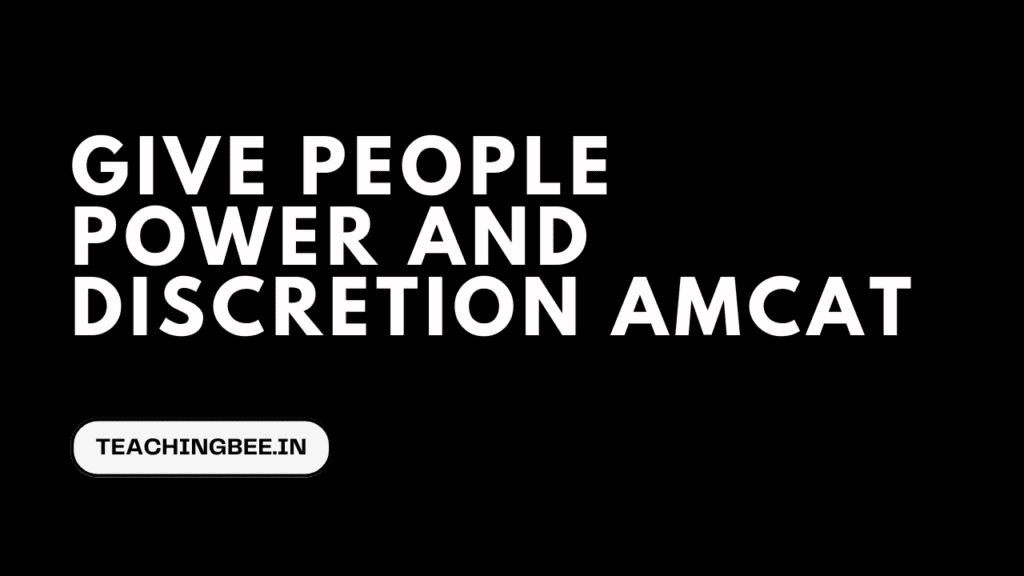Table of Contents
ToggleComprehension Passage
Give people power and discretion, and whether they are grand viziers or border guards, some will use their position to enrich themselves. The problem can be big enough to hold back a country’s development.
For most people in the world, though, the worry is not that corruption may slow down their country’s GDP growth. It is that their daily lives are pervaded by endless hassles, big and small. And for all the evidence that some cultures suffer endemic corruption while others are relatively clean, attitudes towards corruption, and even the language describing bribery, is remarkably similar around the world. In a testament to most people’s basic decency, bribe-takers and bribe-payers have developed an elaborate theater of dissimulation. This is not just to avoid detection. Even in countries where corruption is so common as to be unremarkable and on the prosecutor and even when the transaction happens far from snooping eyes bribe is almost always dressed up as some other kind of exchange.
Though most of the world is plagued by corruption, even serial offenders try to conceal it.
One manifestation of this is linguistic. Surprisingly few people say: “You are going to have to pay me if you want to get that done.” Instead, they use a wide variety of euphemisms. One type is quasi-official terminology. The term widely used at border crossings is “expediting fee”. For a euphemism it is surprisingly accurate: paying it will keep your bags, and perhaps your contraband, from being dumped onto a floor and sifted through at a leisurely pace. (A related term, used in India, is “speed money”: paying it can get essential business permits issued considerably faster.)
The second type of euphemism dresses up a dodgy payment as a friendly favor done by the bribe-payer. There is plenty of creative scope. Nigerian policemen are known to ask for “a little something for the weekend”. Mexican traffic police will suggest that you buy them a refresco, a soft drink, as will Angolan and Mozambican petty officials, who call it a gazebo in Portuguese. Double meaning can help soothe the awkwardness of bribe-paying. Baksheesh, originally a Persian word now found in many countries of the Middle East, can mean “tip”, “alms” and “bribe”. In Kenya, a machinegun-wielding guard suggested to a terrified Canadian aid worker: “Perhaps you would like to discuss this over chai?” The young Canadian was relieved: the difficulty could be resolved with some chai, which means both “tea” and “bribe”.
Along with the obscurantist language, bribe-taking culture around the world often involves the avoidance of physically handing the money from one person to another. One obvious reason is to avoid detection, which is why bribes are known as “envelopes” in countries from China to Greece. But avoidance of a direct handover is common even where there is no chance of detection.
There will always be some officials who will take money right from a bribe payer’s hands, but most seem to prefer to find some way to hide the money from view.
Rich Westerners may not think of their societies as plagued by corruption. But the definition of bribery clearly differs from person to person. A New Yorker might pity the third-world businessman who must pay bribes just to keep his shop open. But the same New Yorker would not think twice about slipping the $50 to sneak into a nice restaurant without a reservation. Poor people the world over are most infuriated by the casual corruption of the elites rather than by the underpaid, “tip”-seeking soldier or functionary. Thus there is no single cultural or social factor that inclines a society towards corruption, but economic factors play a big part. Most clearly, poverty and bribery go together.
Questions
1. What is the author likely to agree to in the following?
A. Some cultures suffer corruptions while others do not.
B. Social factors incline a society towards corruption.
C. Bribery is not a cultural phenomena.
D. None of these
Answer: C
Explanation: The author is likely to agree with the statement that bribery is not a cultural phenomenon. Throughout the passage, the author discusses how attitudes towards corruption and the language describing bribery are remarkably similar around the world, suggesting that bribery is not limited to specific cultures.
2. Which of the following the author does not identify as linguistic manifestation of corruption?
A. Asking for a favor.
B. Use of double meanings.
C. Use of quasi-official terminology.
D. Related to a food item.
Answer: D
Explanation: The author does not identify the use of a food item-related term as a linguistic manifestation of corruption. The passage mentions various ways in which corruption is described using language, but it does not specifically mention food-related terms.
3. What is bribe generally called in China?
A. Hand-over
B. Refresco
C. Envelopes
D. Baksheesh
Answer: D
Explanation: The passage mentions that bribes are known as “envelopes” in countries from China to Greece. Therefore, a bribe is generally called “envelopes” in China.
4. In summary what does the passage primarily suggest and provide evidence for?
A. Corruption is always concealed in some way, both linguistically and in the process.
B. Corruption exists only in developing economies.
C. Corruption is an unethical practice.
D. Corruption slows down GDP growth.
Answer: A
Explanation: The passage primarily suggests that corruption is always concealed in some way, both linguistically and in the process of exchanging bribes. It provides evidence for this by discussing various linguistic manifestations of corruption and how bribery is often hidden from view.
5. What could be the meaning of the word ‘dissimulation’, as can be inferred from the context it is used in the first line of the passage?
A. Hypocrisy
B. Clarity
C. Frankness
D. Insult
Answer: A
Explanation: In the context of the passage, “dissimulation” refers to the act of concealing or pretending, often with the intention to deceive. It is similar in meaning to “hypocrisy,” as people pretend not to engage in corrupt practices even when they do.
6. What best represents the author’s attitude towards the rich people in the West?
A. Appreciative
B. Mildly critical
C. Heavily critical
D. Mildly appreciative
Answer: B
Explanation: The author’s attitude towards rich people in the West is mildly critical. The passage mentions that rich Westerners may not think of their societies as plagued by corruption, but the author suggests that they engage in casual corruption, such as slipping money to get favors.
7. What is the author most likely to agree to?
A. People generally do not try to hide money taken as a bribe.
B. People hide money taken as a bribe primarily to avoid detection.
C. People hide money taken as a bribe from view even if detection possibility is low.
D. None of these
Answer: C
Explanation: The author is most likely to agree that people hide money taken as a bribe from view even if the possibility of detection is low. The passage discusses how bribe-takers and bribe-payers often engage in an elaborate theater of dissimulation to hide the exchange of bribes.
8. What could be the meaning of the word ‘obscurantist’ as inferred from the passage?
A. Clear
B. Unclear
C. Nasty
D. Polite
Answer: B
Explanation: In the context of the passage, “obscurantist” means something that obscures or makes things unclear. The passage mentions “obscurantist language,” which refers to language that hides or obfuscates the true nature of bribery. So, the meaning is “unclear” or “obscure.”
Explore other similar questions and answers here.




